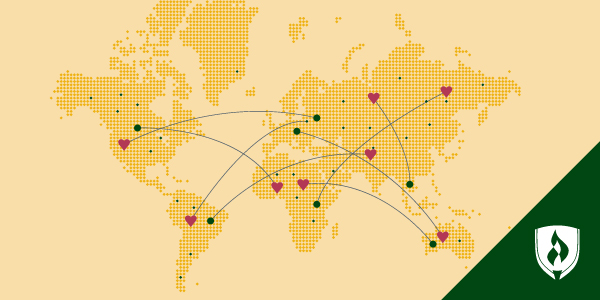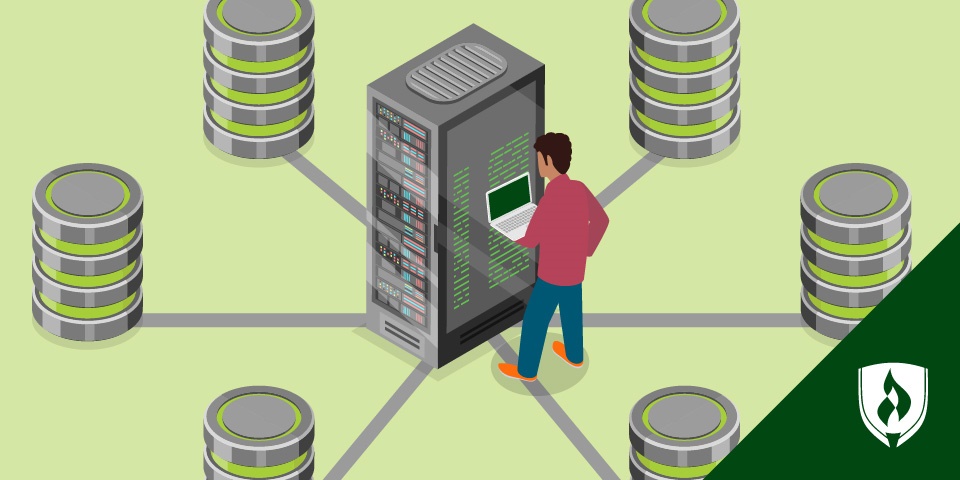What Does a Network Technician Do? Cracking the Code on This Versatile Role
By Noelle Hartt on 05/23/2024

Without networks, the world as we know it today just couldn’t exist. Everything from our jobs to our banks, schools and healthcare system uses computer networks to store and access information. And that’s all made possible, in large part, thanks to the work of network technicians.
But what exactly does this career path entail, and what does your day-to-day look like when you become a network technician? We’re breaking down all the details, so just keep reading to find out!
What does a network technician do?
Network technicians (AKA “computer network technicians”) provide technical support to companies by building, maintaining and (when necessary) repairing network systems. They also help keep office computer systems running smoothly and work to establish secure company Internet connections.
Basically, there’s never a dull moment for these professionals. As Professor Scott Haynes of the Rasmussen School of Technology says, network technicians have a fairly long list of job duties.
“Tasks can range from troubleshooting and repairs, installation and configuration of network components, to technical support and educating employees on the aspects of the network and keeping it secure,” shares Haynes.
What are some common network technician responsibilities?
Specific responsibilities will depend on the size and needs of the organization a network technician works for. A hospital system, for example, will have different network requirements than, say, an online retailer.
“In a smaller company, the network technician may handle a broader range of duties, due to the lack of IT staff,” Haynes says. “In a large company or corporation, the network technician may specialize in specific areas, such as security, wireless networks, data centers, etc.”
Solving all kinds of problems
But there’s one responsibility all network technicians share in common: problem-solving. Organizations rely on these professionals to correct a whole slew of issues: slow Internet connections, trouble sending or receiving emails, faulty or broken network equipment—the list goes on.
“In my opinion, the most appealing part about working as a network technician is that every day you are on what I like to call a ‘problem-solving adventure,’” Haynes shares. “It is a thrill when you can solve a complex problem within a network that may be a crucial part of the company’s overall function.”
As a computer network technician, you’re guaranteed to hear about any and every complication that arises within your organization’s (or client’s) network system. Being adept at solving problems isn’t just helpful in this role; it’s required.
Thinking fast on your feet
“This skill is crucial, because a network technician will be dealing with a wide range of complex issues that are probably time-sensitive, meaning they need to be fixed ASAP,” says Haynes.
Continuous learning
Speaking of timeliness, network technicians need to keep up with the latest developments in this ever-evolving field. As new equipment and network technologies redefine how we all communicate, network technicians simply can’t afford to fall behind.
You need to be good at learning and motivated to stay on top of things that could become a big deal in the field.
Where do network technicians work?
Computer networks are fundamental aspects of so many businesses, in a variety of industries.
Some organizations may choose to hire their own in-house IT teams. Others might outsource IT and network-related tasks to third-party vendors. So, as a network technician, you may find job opportunities in both types of settings.1
Network technician vs. network engineer
Technicians and engineers are both key members of an organization’s network team. Compared to a computer network technician, however, a network engineer has a more senior position, which comes with greater responsibilities. Rasmussen University does not offer any programs that will lead to the career opportunity of network engineer.
According to Indeed, the “network engineer” job title may involve:
- Maintaining computer networks, software and hardware
- Securing data by managing firewalls and using anti-virus software
- Installing and configuring network equipment
- Monitoring and troubleshooting network performance
- Performing network upgrades and installing security patches or service packs as needed
- Optimizing network performance3
What does the career path of a network technician look like?
A computer network technician role is anything but a dead-end job. Working your way up to a network engineer role is just one of many possibilities when you work in this role. “Career advancement could consist of becoming the network administrator for a company, a systems engineer, the information technology manager and so on,” says Haynes.
It all comes down to having a strong work ethic and commitment to your career.
“If a network technician has the technical skills, can adapt to advancing and changing technology, and be a continuous learner, career advancement will come,” Haynes adds.
Types of computer networks technicians manage
There’s no shortage of computer network types, and as technology has become more advanced through the years, the list has only grown larger. IBM® identifies the following types of computer networks as the most common:
- LAN – local area network
- WLAN – wireless local area network
- WAN – wide area network
- MAN – metropolitan area network
- PAN – personal area network
- SAN – storage area network
- CAN – campus area network
- VPN – virtual private network4
What are some common misconceptions about network technicians?
There’s a lot of misinformation floating around out there in cyberspace.
“One misconception students may have is that a network technician job is only about fixing problems,” says Haynes. “Network technicians also help design networks, plan upgrades and implement security updates and fixes.”
Working as a network technician can provide an enriching experience through a broad scope of responsibilities that extends well beyond repairing computer networks, as Haynes explains. “It offers technical challenges, creativity and collaboration with other professionals.”
Should you become a network technician?
Now that you know what a network technician does, are you feeling inspired? Does the job description line up with your own strengths, goals and interests?
If so, you may wish to consider studying Network Systems Administration. This online program helps strengthen your technical skills through project-based courses. You can also gain hands-on experience working with industry hardware and software as you complete virtual labs.
Get the logistic details at Rasmussen’s Network Systems Administration degree page.
IBM® is a registered trademark of INTERNATIONAL BUSINESS MACHINES CORPORATION
1Phil Lombardi, What Do Network Technicians Do? (Common Duties and Skills), (May. 23 2023), What Do Network Technicians Do? (Common Duties and Skills) | Indeed.com
2Nate Swanner, Network Engineer Career Path: What You Need to Know, (Jul.14 2023), Network Engineer Career Path: What You Need to Know | Dice.com Career Advice
3Indeed, What Does a Network Engineer Do? (And How to Become One, (Apr.1 2024), What Does a Network Engineer Do? (And How To Become One) | Indeed.com
4IBM, What is networking?, (accessed April 2024), What Is Networking? | IBM




